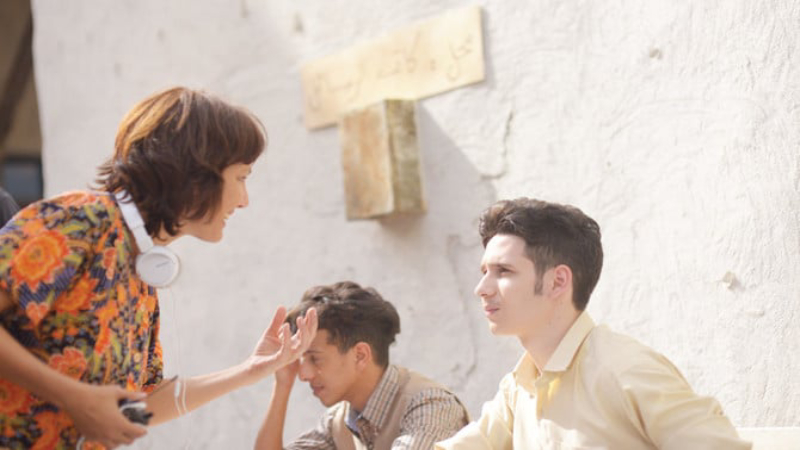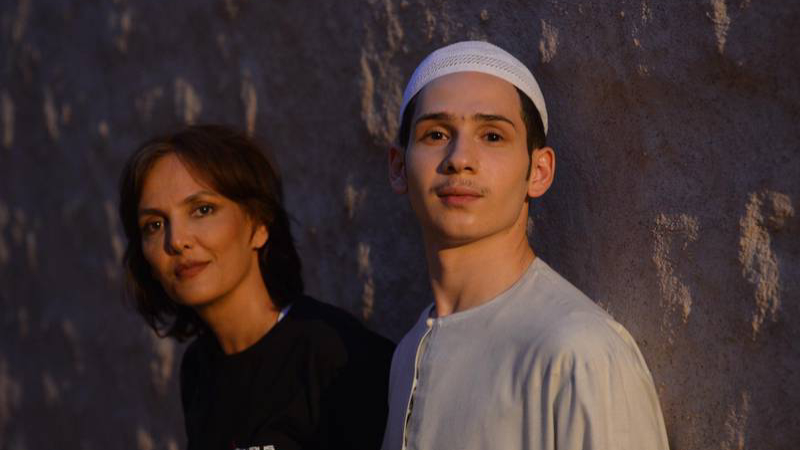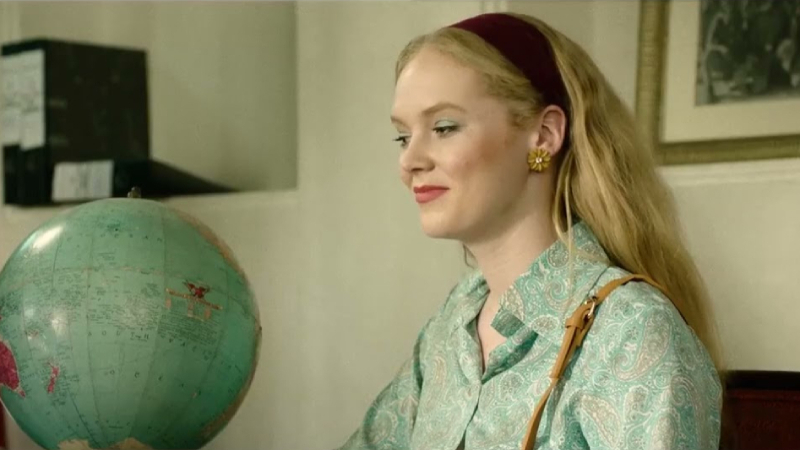Layla Kaylif is the woman behind The Letter Writer, a film which she wrote, direct, and in which she also plays a small role. DMovies‘ editor Victor Fraga sat down with Layla at the BFI Southbank a few days before her movie about interracial, intercontinental and platonic love is launched on both sides of the Atlantic.
They talked about how the project originated, casting and filming in the UAE, recreating the Arab country in the 1960s (a few years before its independence), finding the perfect English rose, her passion for Latin America, women filmmakers in the Middle East, and much more!
…
.
Victor Fraga – When and where did this international, multicultural film journey begin, and how long it took from conception to completion?
Layla Kaylif – So basically, growing up, my father would tell us stories about his childhood, and, he was a letter writer, that was his summer job. A lot of things in the film that are based on my parents and the rest of my family. I was a bit of obsessed with my grandmother, she was of this little Buddha kind of character, and I was always quite intimidated by her. I’m a sort of person that likes to tell stories. So I the idea of this particular story started percolating in my head 20 years ago. At some point, I just decided to write the script, and the first draft was ready in 2013. I won the IWC Filmmaker Award at the Dubai International Film Festival. I had given my father the script, but he wouldn’t read it. My dad is a very gruff character. Not gruff, but honest. And he was like: “yeah, whatever!”. And then when won the IWC Filmmaker Award, he was like: “maybe I should read this script after all, you know?”. And he really loved it. Plus, he said there were a lot of accuracies!
So in 2015 I got some money for development. Then I went to Dubai, and we went into production. Fun! The main issue was finding a producer. The Dubai independent film sector is extremely tough. It’s not like England where like you can hire a DoP who works on big scene,, who works on a commercial gig one day, and then gives you a good rate. And line producers are almost non-existent. Okay. It’s a very commercial based industry. It was an extraordinary struggle not just in terms of crew. So I found, I finally found Chris Buschek, and he was wonderful. God bless him. He died a year ago, bless him. He was a wonderful man. And he got behind me. He brought that energy and he got the crew. I met my DoP Arturo [Vasquez] in England, where he was living. The whole thing was very incremental.
VF – Could you please tell us about casting? How did you approach Rosie McEwen, and the are the rest of the cast Emirati?
LK – I put out a request. Eslam [Al Kawarit] sent me a little video of himself, and I was like: “This is my Khalifa”. This was like a year before we made the film. But, Mr. Mohammed [Muhammad Amir Nawaz] was a waiter and in a in a coffee shop I used to frequent in Dubai. I used to go in there for about five years. I told him: “You’re gonna be in my movie one day”, and he thought I was crazy!
I was looking for an English Rose to play Elli. I just Googled actors. And then I saw a headshot of Rosy [McEwen]…
VF – You fell in love with a photograph, just like the character in your film?
LK – I did! I was like, that’s her. That’s my Ellie. So I called her agent and said that she’s beautiful.

VF – She’s quintessentially English.
LK – And she’s so so lovely. And then we zoomed and and that was it. She wasn’t very well known then. I think since then she’s done stuff. She’s really up and coming now!
VF – What about the rest of the cast?
LK – We have a pool of talent in Dubai, but they they predominantly work on commercials. Or maybe if there’s a film shooting in Dubai. Some of the smaller roles were given to professional actors. Like Kaltham, she’s the star in that movie you reviewed, Dalma [Humaid Alsuwaidi, 2023]. She’s just under a different name [M. Hira]. Everyone was local, except for Rosy.
VF – Was the Brazilian film Central Station (Walter Salles, 1998), also about a letter writer, an influence?
LF – Well the funny thing is I had written the script before I saw it and then I watched it and I was like “oh my God, I love this film”. And and to be honest with you, I wish I could have replicated some of it.. I love it in the Central Station [train station], the footage of the way when she’s writing, when she’s talking to the customers. It’s very dynamic. I wanted the camera to roll. I wanted to capture more kind of the impromptu action. I wanted more handheld, but everything was very static. Arturo and I wanted to shoot some scenes where Khalifa was wandering through the town. We were very limited in terms of our locations. We were lucky that we found that one location, in order to recreate Old Dubai.
VF – What filmmakers influenced you?
LK – I love Latin American cinema. Like Water for Chocolate [Alfonso Arau, 1992] is one of my favourite films. I just love the aesthetics. Platinum. I’m by the way, I’m a Latin America-phile, that’s why I like you [laughs]. European Spain is very different culturally. I was very good friends at one point with Paulo Coelho. That’s the only other Brazilian like, oh yeah. And you know, There’s just something Arab about you guys.
VF – Well, he did write a book called The Alchemist [about a boy’s journey through the Arab world]… Let’s now talk about your locations,. Your film shows a Dubai foreign to modern-day eyes. Where did you film it, and how did UAE audiences react?
LK – We found a location that was still under development. It was called Al Seef Heritage Area. It’s a location that was still not open to the public. Ultimately, Dubai is very oriented for tourism and business. We were very lucky to find area.
VF – You are mixed race, yourself the byproduct of Arab-British romance. Did your parents encounter many objections to their relationship?
LK – There was like a sort of a generation of young Arab men in the 60s who went to England and then married their English roses. It was like something in the water. My dad sort of looked a bit like Omar Sharif. Omar Sharif was such an archetype! My Arab family loved my British mum, and welcomed her. I grew up with kids from mixed marriages. Culturally, they were outliers. The families were very accepting of the foreign bride. There was no issue.
VF – Is that because the foreign was a female?
LK – Yes! Muslim men can marry Christian and Jewish women, but not the other way around. Unless the man converts to Islam. The Quran says there is no compulsion in religion, so it would have to be his choice.
VF – Your movie is an Emirati production, but with a string British element. Did you attempt to get British funding?
LK – We did post-production in Britain. And it would have passed the cultural test. In the end, I did not bother. But I got financing from the UAE.
VF – What barriers did you encounter as a female filmmaker in the UAE, and is that changing?
LK – I wasn’t part of the filmmaking environment, the clique. Nayla [Al-Khaja] struggled to get her film made [Three, which showed at Red Sea International Film Festival in 2023]. We went to the same school. She is younger than me, but we both went to Latifa School for Girls [in Dubai]. I watched the first documentary she made, years and years ago. It’s a small community. Image Nation is the funding body, and they have an Emirati filmmaking department. And there’s like three people who they fund, and that;’s three guys. That’s their go-to’s. It’s very institutionalised. They make films that reflect their ethos.
VF – That doesn’t sound like an environment that’s easy to break into!
LK – I met with these people. I went to Image Nation, in my first round of getting the film made. And I just realised we weren’t on the same page. They were going to appropriate it and make it into something they wanted to make. To me, film is a vocation. I’m not doing film because I want to become a UAE mascot. I don ‘t really fit the mould. the reality is that I made my film independently. I’m proud. It’s probably the first fully independent film made in the UAE. I think Nayla did hers independently, too.
I don’t get prejudice for being a professional woman. I’m not a stripper, you know [laughs]? Dubai is very pro-female in the workplace. It’s about policies of the industry, and the people involved.

VF – It seems to me that you opted to leave religion out of your film, or at least the direct debate on religious tolerance. On the other hand, you address racism and xenophobia. Why is that?
LK – Actually, I did put a little bit of religion in the film. You missed it! It’s my feminine aspect. Islam is a very yang faith. Sufism is the mystical element of Islam. The yin of Islam. The idea of the yin and the yang. This is an area that hasn’t been developed sufficiently. You know when he [Khalifa] is writing the letter to Miss Elli saying “All the creatures are crying because the most beauty in all of Allah’s world is far away”, and the lady is praying behind him. Do you remember this scene? That was my nod to Islam, the feminine side of Islam.
VF – You are also a singer. Could you please tell us how you intend to reconcile this with your filmmaking career? Are female singers frowned upon in the UAE, and more so than women filmmakers?
LK – The Emirati community are even more conservative than the Saudi and the Kuwaiti communities. I happen to come from a very conservative family. But I’m not subject to the same rules because my mom is English. Having said that, being a singer caused tremendous problems. That was 20 years ago. When I released my song, my family were outraged. There is a very specific Emirati aesthetic and culture, and I don’t look like that. My father comes from the establishment, so i have to tread very carefully.
I come from a conservative culture and I have my boundaries. In Iranian cinema, there are a lot of boundaries. Shakespeare lived in a police state. I mean Elizabethan England was a police state. People in this part of the world no longer understand what it’s like to live in a society that’s controlled, that’s authoritarian. They don’t understand the realities of that environment, they don’t realise Shakespeare had to write under very strict parameters.
The good thing about the Arab world, when you get over a certain age nobody cares what you do anymore. Women above a certain age are put out to pasture.
VF – Beyond the expiry date?
LK – I am expired. Well, whatever! [laughs] The other thing is when you are married…
VF – I’m glad you talked about marriage because I wanted to address that topic. In your film, marriage is the only way of consummating love. Even Khalifa dreams of marrying Elli, Elli wants to marry a man in Britain, and so on. Does the possibility of being a a loving relation outside the institution of marriage exist?
LK – It’s a conservative culture. Women aren’t even allowed to date. It’s a “don’t ask, don’t tell” culture. Even within the traditional culture, women won’t marry outside the extended family.
VF – Is that not changing?
LK – Not that I can see. This is how I compare it: imagine that your family were Amish people. So when I visit my relatives, I’m in Amish land. I love my family and they love me, but they understand we live in different universes.What most people don’t actually realise is that within the UAE, amongst the indigenous population, women are empowered, educated, they are encouraged to work. These girls don’t feel like they’re oppressed, I would guess. I know my cousins and my second cousins would marry according to the expectations. At some point, I was an insider, when I was growing up [they would say]: “of course you’re gonna marry your cousin”.
VF – Is arranged marriage still a thing?
LK – Yes, sort of. I can’t speak for every family. I can only speak for my family.
VF – Neighbouring Saudi Arabia has seen major advance for women, film and also specifically for women filmmakers. Why do you think that is, and are these changes here to stay?
LK – Saudi women of a certain class were always very liberated outside Saudi Arabia. I remember when I was a kid, Saudi women would come here to the UK and they wouldn’t veil anymore. While Emirati women would keep their veil on. A lot of these Saudi women who are now filmmakers, they were already outsiders, and abroad they would look Westernised. You are not seeing the emergence of a different type of person, you’re just seeing the ability to do it inside the country.
VF – What is your message for aspiring women filmmakers in the UAE or anywhere else in the Arab world?
LK – You must develop the [film] industry internally! It’s a structural thing. It’s not a feminist issue. The question of conservatism is about sexual conservatism, in terms of chastity, not so much professional conservatism.
…
.
The image as the top of this article was snapped by Sonya Jasinski. The remaining images are production stills by Alejando Iodice.









